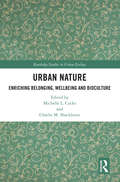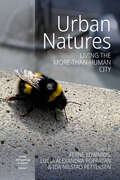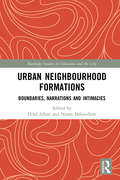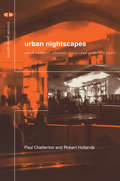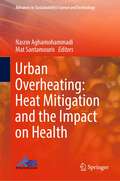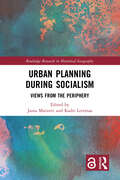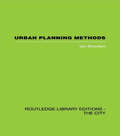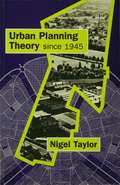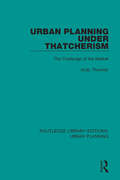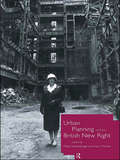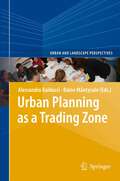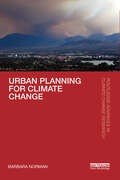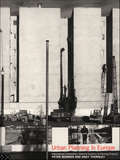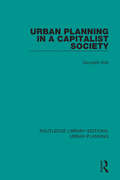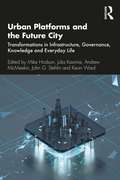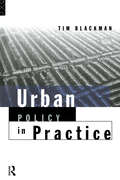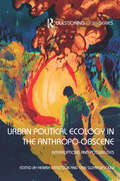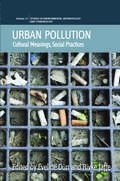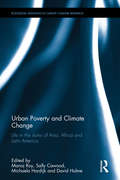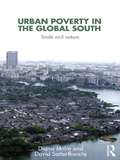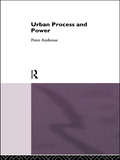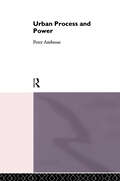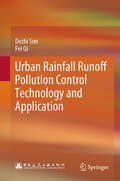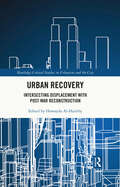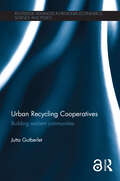- Table View
- List View
Urban Nature: Enriching Belonging, Wellbeing and Bioculture (Routledge Studies in Urban Ecology)
by Michelle L. Cocks and Charlie M. ShackletonThis book showcases the diversity of ways in which urban residents from varying cultural contexts view, interact, engage with and give meaning to urban nature, aiming to counterbalance the dominance of Western depictions and values of urban nature and design. Urban nature has up to now largely been defined, planned and managed in a way that is heavily dominated by Western understandings, values and appreciations, which has spread through colonialism and globalisation. As cities increasingly represent a diversity of cultures, and urban nature is being increasingly recognised as contributing to residents' wellbeing, belonging and overall quality of life, it is important to consider the numerous ways in which urban nature is understood and appreciated. This collection of case studies includes examples from Africa, Asia, Europe, North and South America, and reflects on the multi-dimensional aspects of engagements with urban nature through a biocultural diversity lens. The chapters cover several themes such as how engagements with nature contribute to a sense of wellbeing and belonging; the implications that diversity has on the provision, design and management of urban environments; and the threats inhibiting residents’ abilities to engage meaningfully with nature. The book challenges the dominant discourse, Western ideological understandings and meta-narratives of modernisation and unilineal urban transitions. A timely addition to the literature, Urban Nature: Enriching Belonging, Wellbeing and Bioculture offers an alternative to Western ideological understandings of nature and values and will be of great interest to those working in human and environmental urban ecology. It will also be key reading for students in the relevant fields of anthropology, development studies, geography, social ecology and urban studies.
Urban Natures: Living the More-than-Human City (Urban Anthropology Unbound #1)
by Ida Nilstad Pettersen Ferne Edwards, Lucia Alexandra PopartanEfforts to create greener urban spaces have historically taken many forms, often disorganized and undisciplined. Recently, however, the push towards greener cities has evolved into a more cohesive movement. Drawing from multidisciplinary case studies, Urban Natures examines the possibilities of an ethical lively multi-species city with the understanding that humanity’s relationship to nature is politically constructed. Covering a wide range of sectors, cities, and urban spaces, as well as topics ranging from edible cities to issues of power, and more-than-human methodologies, this volume pushes our imagination of a green urban future.
Urban Neighbourhood Formations: Boundaries, Narrations and Intimacies (Routledge Studies in Urbanism and the City)
by Hilal Alkan Nazan MaksudyanThis book examines the formation of urban neighbourhoods in the Middle East, Africa, and South Asia. It departs from ‘neighbourhoods’ to consider identity, coexistence, solidarity, and violence in relations to a place. Urban Neighbourhood Formations revolves around three major aspects of making and unmaking of neighbourhoods: spatial and temporal boundaries of neighbourhoods, neighbourhoods as imagined and narrated entities, and neighbourhood as social relations. With extensive case studies from Johannesburg to Istanbul and from Jerusalem to Delhi, this volume shows how spatial amenities, immaterial processes of narrating and dreaming, and the lasting effect of intimacies and violence in a neighbourhood are intertwined and negotiated over time in the construction of moral orders, urban practices, and political identities at large. This book offers insights into neighbourhood formations in an age of constant mobility and helps us understand the grassroots-level dynamics of xenophobia and hostility, as much as welcoming and openness. It would be of interest for both academics and more general audiences, as well as for students of undergraduate and postgraduate courses in Urban Studies and Anthropology.
Urban Nightscapes: Youth Cultures, Pleasure Spaces and Corporate Power
by Paul Chatterton Robert HollandsIn many western cities, urban nightlife is experiencing a 'McDonaldisation', where big branded names are taking over large parts of downtown areas, leaving consumers with an increasingly standardised experience. This book takes a new look at this rapidly changing aspect of urban life, examining the relationships between young adults, nightlife and city spaces. It focuses on what the authors call 'urban nightscapes' - both mainstream and alternative youthful cultural activities in bars, pubs, night-clubs and music venues, which occur against a backdrop of increasing corporate influence in the night-time economy.
Urban Overheating: Heat Mitigation and the Impact on Health (Advances in Sustainability Science and Technology)
by Mat Santamouris Nasrin AghamohammadiThe book reviews and reports the recent progress and knowledge on the specific impact of current and projected urban overheating as well as of the urban mitigation technologies on mortality and morbidity and urban vulnerability. It presents recent data and developments on the topic reported by some of the more distinguished researchers in this area. In parallel, it discusses new findings related to the characteristics and the magnitude of urban overheating and reports and analyzes the recent knowledge on the synergies between urban heat island and heatwaves. This book helps to advance our understanding on the interaction between Urban Heat Island (UHI) and overheating as well as their impact on energy demand and public health globally. Exploring the interaction between UHI and energy consumption requires the understanding on the dynamics of UHI intensity and air pollution index in different land use and how such interactions may vary in different cities in the world. Moreover, this book focuses on different cities in Australia, Austria, Belgium, Brazil, Canada, Cyprus, Greece, Hong Kong, India, Asia, Spain, UK, and USA.
Urban Planning During Socialism: Views from the Periphery (Routledge Research in Historical Geography)
by Jasna Mariotti Kadri LeetmaaUrban Planning During Socialism delves into the evolution of cities during the period of state socialism of the 20th century, summarizing the urban and architectural studies that trace their transformations. The book focuses primarily on the periphery of the socialist world, both spatially and in terms of scholarly thinking. The case study cities presented in this book draw on cultural and material studies to demonstrate diverse and novel concepts of ‘periphery’ through transformations of socialist cityscapes rather than homogenous views on cities during the period of state socialism of the 20th century. In doing so the book explores the transversalities of political, economic, and social phenomena; the places for everyday life in socialist cities; the role of professional communities on production and reproduction of space and ecological thinking. This book is aimed at scholarly readership, in particular scholars in architecture, urban planning, and human geography, as well as undergraduate, graduate, and post-graduate students in these disciplines studying the urban transformation of cities after World War II in socialist countries. It will also be of interest for planning officials, architects, policymakers and activists in former socialist countries.
Urban Planning Methods: Research and Policy Analysis
by Ian BrackenIn order to develop and exercise their skills urban planners need to draw upon a wide variety of methods relating to plan and policy making, urban research and policy analysis. More than ever, planners need to be able to adapt their methods to contemporary needs and circumstances. This introductory textbook focuses on the need to combine traditional research methods with policy analysis in order to understand the true nature of urban planning processes. It describes both planning methods and their underlying concepts and principles, illustrating applications by reference to the daily activities of planning, including the assessment of needs and preferences of the population, the generation and implementation of plans and policies, and the need to take decisions related to the allocation of land, population change, employment, housing and retailing. Ian Bracken also provides a comprehensive guide to the more specialized research literature and case studies of contemporary urban planning practice. This book was first published in 1981.
Urban Planning Theory since 1945 (Urban Studies)
by Nigel TaylorFollowing the Second World War, modern systems of urban and regional planning were established in Britain and most other developed countries. In this book, Nigel Taylor describes the changes in planning thought which have taken place since then. He outlines the main theories of planning, from the traditional view of urban planning as an exercise in physical design, to the systems and rational process views of planning of the 1960s; from Marxist accounts of the role of planning in capitalist society in the 1970s, to theories about planning implementation, and more recent views of planning as a form of `communicative action′.
Urban Planning Under Thatcherism: The Challenge of the Market (Routledge Library Editions: Urban Planning #21)
by Andy ThornleyOriginally published in 1991, Urban Planning Under Thatcherism links theory and practice to assess the changes to the planning system since 1979. It analyses the major trends by investigating the individual modifications in the legislation and the new initiatives which have introduced procedures to by-pass the normal system. Such changes are fundamental not only to the built environment but to the quality of urban life and ultimately to the nature of society. The book argues that this orientation is the result of a policy shift from local democracy to centralisation and from the criteria of the public interest to those of the market.
Urban Planning and the British New Right
by Huw Thomas Philip AllmendingerDid the 1980s and 1990s see the death of planning?Exposing the myth that has grown up around Thatcherism, leading experts from a wide range of land-use policy areas examine the changes that were brought about in planning and the environment during the 1980s and 1990s, and argue that much less was achieved than expected.Urban Planning and the British New Right questions common assumptions about planning practices under Thatcherism, concluding that the complex relationship of power between central, local and national government requires a sensitivity to change that is inclusive rather than doctrinal. This is a book that says as much about the administration, institutions and processes of planning as it does about Mrs Thatcher's attempts to change it.
Urban Planning as a Trading Zone
by Raine Mäntysalo Alessandro Balducci'Trading zone' is a concept introduced by Peter Galison in his social scientific research on how scientists representing different sub-cultures and paradigms have been able to coordinate their interaction locally. In this book, Italian and Finnish planning researchers extend the use of the concept to different contexts of urban planning and management, where there is a need for new ideas and tools in managing the interaction of different stakeholders. The trading zone concept is approached as a tool in organizing local platforms and support systems for planning participation, knowledge production, decision making and local conflict management. In relation to the former theses of communicative planning theory that stress the ideals of consensus, mutual understanding and universal reason, the 'trading zone approach', outlined in this book, offers a different perspective. It focuses on the potentiality to coordinate locally the interaction of different stakeholders without requiring the deeper sharing of understandings, values and motives between them. Galison's commentary comes in the form of the book's final chapter.
Urban Planning for Climate Change (Routledge Advances in Climate Change Research)
by Barbara NormanThis book tackles the future challenges and opportunities for planning our cities and towns in a changing climate and recommends key actions for more resilient urban futures. Urban Planning for Climate Change focusses on how urban planning is fundamental to action on climate change. In doing so it particularly looks at current practice and opportunities for innovation and capacity building in the future - carbon neutral development, building back better and creating more resilient urban settlements around the world. The complex challenge of possible urban resettlement from the impact of climate change is covered as a special issue bringing a focus on adaptation, working with nature and delivering real action on climate change with local communities. Norman recommends ten essential actions for urban planning for climate change along with some suggestions to inspire the next generations to embrace these opportunities with creativity and innovation. Featuring key messages and implications for practice in each chapter, this book will be of great interest to students, scholars, practitioners and communities involved in planning more climate resilient urban and regional futures.
Urban Planning in Europe: International Competition, National Systems and Planning Projects
by Peter Newman Andy ThornleyUrban planning is undergoing a period of transformation across Europe, with a major trend towards increased urban competition, national deregulation and greater private sector influence.Urban Planning in Europe is the first comprehensive analysis of the influence of countries is developed, presenting the similarities and differences of each country's national planning system. The authors use detailed case studies to explore planning policies in a range of European cities, and discuss the social and environmental objectives that influence today's urban planner.Urban Planning in Europe is an essential guide to contemporary European planning projects and highlighting opportunities for innovation which contain vital lessons for the future of urban decision making.
Urban Planning in a Capitalist Society (Routledge Library Editions: Urban Planning #15)
by Gwyneth KirkOriginally published in 1980, Urban Planning in a Capitalist Society addresses land use planning as both a technical and a political activity, involving the distribution of scarce resources – land and capital. The book reviews and assesses the strengths and weaknesses of several theoretical perspectives, and pluralist, bureaucratic, reformist and Marxist approaches to the distribution of power, and hence resources in a capitalist society. It concentrates on the role played by planning professionals, the opportunity for the public to influence land use planning decision making, and the scope for political action concerning planning.
Urban Platforms and the Future City: Transformations in Infrastructure, Governance, Knowledge and Everyday Life
by Mike Hodson; Julia Kasmire; Andrew McMeekin; John G. Stehlin; and Kevin WardThis title takes the broadest possible scope to interrogate the emergence of “platform urbanism”, examining how it transforms urban infrastructure, governance, knowledge production, and everyday life, and brings together leading scholars and early-career researchers from across five continents and multiple disciplines. The volume advances theoretical debates at the leading edge of the intersection between urbanism, governance, and the digital economy, by drawing on a range of empirically detailed cases from which to theorize the multiplicity of forms that platform urbanism takes. It draws international comparisons between urban platforms across sites, with attention to the leading edges of theory and practice and explores the potential for a renewal of civic life, engagement, and participatory governance through “platform cooperativism” and related movements. A breadth of tangible and diverse examples of platform urbanism provides critical insights to scholars examining the interface of digital technologies and urban infrastructure, urban governance, urban knowledge production, and everyday urban life. The book will be invaluable on a range of undergraduate and postgraduate courses, as well as for academics and researchers in these fields, including anthropology, geography, innovation studies, politics, public policy, science and technology studies, sociology, sustainable development, urban planning, and urban studies. It will also appeal to an engaged, academia-adjacent readership, including city and regional planners, policymakers, and third-sector researchers in the realms of citizen engagement, industrial strategy, regeneration, sustainable development, and transport.
Urban Policy in Practice
by Tim BlackmanUrban Policy and Practice is a practical and critical guide to urban policy in contemporary Britain. The book covers a range of topics including: * Quality and consumerism in the public sector * Community development * Public Health * Environmental issues * Local intervention in the creation of skills and jobs Case studies are drawn from housing, planning, the social services, economic development, and local government finance. Throughout, the concern is for a clear analysis of corporate strategies, democratic control and sustainable development.
Urban Political Ecology in the Anthropo-obscene: Interruptions and Possibilities (Questioning Cities)
by Erik Swyngedouw Henrik ErnstsonUrban Political Ecology in the Anthropo-obscene: Interruptions and Possibilities centres on how to organize anew the articulation between emancipatory theory and political activism. Across its theoretical and empirical chapters, written by leading scholars from anthropology, geography, urban studies, and political science, the book explores new political possibilities that are opening up in an age marked by proliferating contestations, sharpening socio-ecological inequalities, and planetary processes of urbanization and environmental change. A deepened conversation between urban environmental studies and political theory is mobilized to chart a radically new direction for the field of urban political ecology and cognate disciplines: What could emancipatory politics be about in our time? What does a return of the political under the aegis of equality and freedom signal today in theory and in practice? How do political movements emerge that could re-invent equality and freedom as actually existing socio-ecological practices? The hope is to contribute discussions that can expand and rearrange critical environmental studies to remain relevant in a time of deepening depoliticization and the rise of post-truth politics. Urban Political Ecology in the Anthropo-obscene will be of interest to postgraduates, established scholars, and upper level undergraduates from any discipline or field with an interest in the interface between the urban, the environment, and the political, including: geography, urban studies, environmental studies, and political science.
Urban Pollution
by Eveline Da¼rr Rivke JaffeRe-examining Mary Douglas' work on pollution and concepts of purity, this volume explores modern expressions of these themes in urban areas, examining the intersections of material and cultural pollution. It presents ethnographic case studies from a range of cities affected by globalization processes such as neoliberal urban policies, privatization of urban space, continued migration and spatialized ethnic tension. What has changed since the appearance of Purity and Danger? How have anthropological views on pollution changed accordingly? This volume focuses on cultural meanings and values that are attached to conceptions of 'clean' and 'dirty', purity and impurity, healthy and unhealthy environments, and addresses the implications of pollution with regard to discrimination, class, urban poverty, social hierarchies and ethnic segregation in cities.
Urban Poverty and Climate Change: Life in the slums of Asia, Africa and Latin America (Routledge Advances in Climate Change Research)
by David Hulme Manoj Roy Sally Cawood Michaela HordijkThis book deepens the understanding of the broader processes that shape and mediate the responses to climate change of poor urban households and communities in Asia, Africa and Latin America. Representing an important contribution to the evolution of more effective pro-poor climate change policies in urban areas by local governments, national governments and international organisations, this book is invaluable reading to students and scholars of environment and development studies.
Urban Poverty in the Global South: Scale and Nature
by David Satterthwaite Diana MitlinOne in seven of the world’s population live in poverty in urban areas, and the vast majority of these live in the Global South – mostly in overcrowded informal settlements with inadequate water, sanitation, health care and schools provision. This book explains how and why the scale and depth of urban poverty is so frequently under-estimated by governments and international agencies worldwide. The authors also consider whether economic growth does in fact reduce poverty, exploring the paradox of successful economies that show little evidence of decreasing poverty. Many official figures on urban poverty, including those based on the US $1 per day poverty line, present a very misleading picture of urban poverty’s scale. These common errors in definition and measurement by governments and international agencies lead to poor understanding of urban poverty and inadequate policy provision. This is compounded by the lack of voice and influence that low income groups have in these official spheres. This book explores many different aspects of urban poverty including the associated health burden, inadequate food intake, inadequate incomes, assets and livelihood security, poor living and working conditions and the absence of any rule of law. Urban Poverty in the Global South: Scale and Nature fills the gap for a much needed systematic overview of the historical and contemporary state of urban poverty in the Global South. This comprehensive and detailed book is a unique resource for students and lecturers in development studies, urban development, development geography, social policy, urban planning and design, and poverty reduction.
Urban Process and Power
by Peter AmbroseUrban Process and Power has two chief aims. Firstly, it analyses and explains a century of the production and reproduction of the urban environment in which most of us live. Secondly, the book focuses on recent changes in the control of these processes and the ideology that has brought these changes about. Immense disparities exist between the "best" and the "worst" urban areas in Britain. Why do these differences arise and how are they perpetuated? The author argues that the growth of such inequality is linked to questions of accountability and the increasing erosion of a democratic principle in the urban process.
Urban Process and Power
by Peter AmbroseUrban Process and Power has two chief aims. Firstly, it analyses and explains a century of the production and reproduction of the urban environment in which most of us live. Secondly, the book focuses on recent changes in the control of these processes and the ideology that has brought these changes about. Immense disparities exist between the "best" and the "worst" urban areas in Britain. Why do these differences arise and how are they perpetuated? The author argues that the growth of such inequality is linked to questions of accountability and the increasing erosion of a democratic principle in the urban process.
Urban Rainfall Runoff Pollution Control Technology and Application
by Fei Qi Dezhi SunThis book comprehensively presents rapid progress and development in urban rainfall runoff pollution control technology in China since the 11th Five-Year Plan period. It covers many aspects of the research including background summary, assessment methods, control technology, and various case studies to the validation of the control theory and the development of sponge city construction. The book appeals to scholars and graduates majoring in environmental engineering and water supply engineering. It is also suitable for practitioners engaged in urban drainage system.
Urban Recovery: Intersecting Displacement with Post War Reconstruction (Routledge Critical Studies in Urbanism and the City)
by Howayda Al-HarithyThis book calls for re-conceptualising urban recovery by exploring the intersection of reconstruction and displacement in volatile contexts in the Global South. It explores the spatial, social, artistic, and political conditions that promote urban recovery. Reconstruction and displacement have often been studied independently as two different processes of physical recovery and human migration towards safety and shelter. It is hoped that by intersecting or even bridging reconstruction with displacement we can cross-fertilize and exploit both discourses to reach a greater understanding of the notion of urban recovery as a holistic and multi-layered process. This book brings multidisciplinary perspectives into conversation with each other to look beyond the conflict-related displacement and reconstruction and into the greater processes of crises and recovery. It uses empirical research to examine how trauma, crisis, and recovery overlap, coexist, collide and redefine each other. The core exploration of this edited collection is to understand how the oppositional framing of destruction versus reconstruction and place-making versus displacement can be disrupted; how displacement is spatialized; and how reconstruction is extended to the displaced people rebuilding their lives, environments, and memories in new locations. In the process, displacement is framed as agency, the displaced as social capital, post-conflict urban environments as archives, and reconstructions as socio-spatial practices. With local and international insights from scholars across disciplines, this book will appeal to academics and students of urban studies, architecture, and social sciences, as well as those involved in the process of urban recovery.
Urban Recycling Cooperatives: Building resilient communities (Routledge Advances in Regional Economics, Science and Policy)
by Jutta GutberletSolid waste is a major urban challenge worldwide and decisions over which technologies or methods to apply can have beneficial or detrimental long-term consequences. Inappropriate management of solid waste can lead to damaging environmental impacts, particularly in the megacities of the Global South. Urban Recycling Cooperatives explores the multiple narratives and interdisciplinary nature of waste studies, drawing attention to the pressing social, economic and environmental challenges related to waste management. The book asks questions such as: how do we define waste and our relation to it; who is involved in dealing with waste; and what power interactions become manifest over issues of accessing and managing waste? In recent years informal cooperatives have emerged, devoted to recycling household and business waste before reclassifying it and redirecting it to the authorities. Hence, these workers are able to reclaim significant amounts of natural resources and thus contribute to the saving of resources and lessened waste management expenditures. With particular reference to the Brazilian megalopolis of São Paulo, this book describes this paradigm shift in the general understanding of waste as unwanted discard towards the recognition of waste as a resource that must be recovered for reuse or recycling. It would be of interest to students and policy makers working in international development and waste management.
